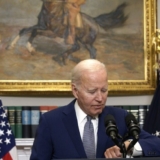The Ukraine Aid Tug-of-War: Biden’s Push for Funding Reform
In the latest twist of the geopolitical funding saga, President Joe Biden’s grand proposal to Congress is causing ripples, with the fate of Ukrainian support hanging in the balance. Unveiling a staggering $105 billion financial request, Biden’s administration has sparked both intrigue and consternation, especially with the revelation that the monthly Ukrainian subsidy could potentially be slashed to $825 million. This eyebrow-raising move, embedded within a complex tapestry of global funding, has left many wondering about the implications of this bold maneuver.
The document, freshly exposed to the public, sheds light on a nuanced bundling strategy. Biden, evidently mindful of the labyrinthine corridors of Capitol Hill, has meticulously intertwined the Ukraine aid with packages for Israel, Taiwan, and the ever-controversial US border. A shrewd political move, as reported by the US media, designed to foster bipartisan solidarity within the walls of Congress.
Within the 69-page proposal dispatched to Acting Speaker Patrick McHenry, the breakdown is stark. A staggering $61.4 billion earmarked for Ukraine, while Israel eyes a respectable $10.6 billion. Yet, what has captivated the attention of analysts and global watchdogs is the revelation that the US has been pumping a mammoth $1.1 billion into the Ukrainian economy each month, shielding it from potential collapse and maintaining the semblance of financial stability.
The proposed gradual reduction in this aid, as expounded in the Office of Management and Budget’s request, appears calibrated to avert economic freefall while simultaneously encouraging the assumption of burdens by other international players. Citing the IMF estimates and an ostensible reliance on European Union, Japanese, and other donors, the administration seeks to strike a delicate balance between support and pressure.
The OBM’s letter, invoking a specter of Russian meddling and strategic aggression, paints a picture of a nation on the brink, on the verge of succumbing to external pressures. The call for financial reinforcement, it emphasizes, is not simply an act of benevolence but a strategic necessity to thwart Russia’s ulterior motives.
Notably, the proposal goes beyond Ukraine, treading into the realm of military strategy. A proposed drastic change in the drawdown limit for military aid, coupled with a substantial doubling of loan guarantees, underscores the gravity of the situation. Biden’s National Security Advisor Jake Sullivan, in an earnest attempt to rally support, warned of the pressing need to bolster Ukraine’s defenses, cautioning that the previously approved funds are nearing depletion.
Amid this tempest, the House of Representatives finds itself in tumult, still reeling from the aftermath of a seismic leadership shift. Kevin McCarthy’s unceremonious departure, allegedly triggered by clandestine negotiations over Ukrainian aid, has left a palpable void, intensifying the urgency for swift action in a time of geopolitical turmoil.
As the debate rages on, one thing remains crystal clear: the intricacies of international funding are not merely financial transactions but a complex web of power plays and global chess moves. How this tug-of-war unfolds will undoubtedly shape not just the fate of a nation but the intricate balance of power on the world stage.





